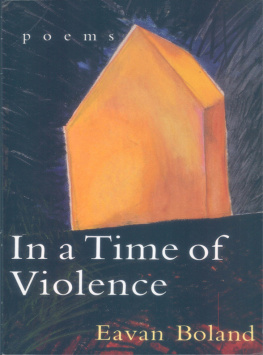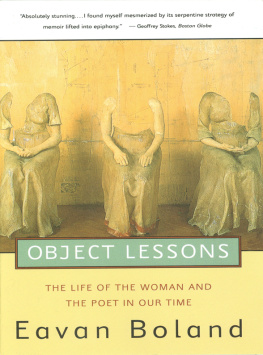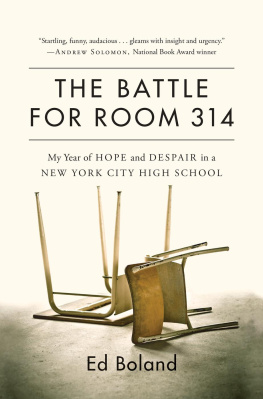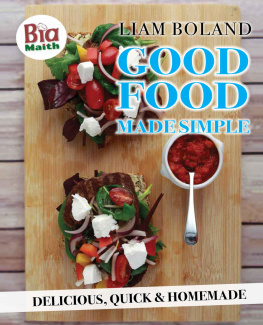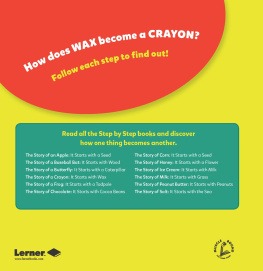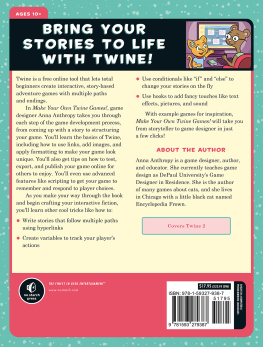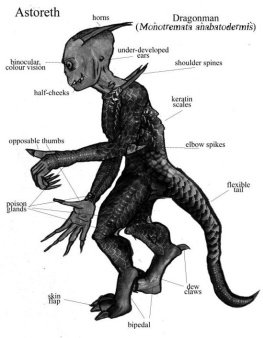I N A T I M E O F V I O L E N C E
I N A T I M E O F V I O L E N C E
OTHER BOOKS BY EAVAN BOLAND
POETRY New Territory The War Horse Night Feed The Journey Selected Poems: 1989 Outside History: Selected Poems 19801990 In a Time of Violence An Origin Like Water: Collected Poems 19671987 The Lost Land PROSE Object Lessons: The Life of the Woman and the Poet in Our Time
In a Time
of
Violence
EAVAN BOLAND W . W . N O R T O N & C O M P A N Y N E W Y O R K / L O N D O N
Contents
Writing
in a
Time of Violence
A SEQUENCE
As in a city where the evil are permitted to have authority and the good are put out of the way, so in the soul of man, as we maintain, the imitative poet implants an evil constitution, for he indulges the irrational nature which has no discernment of greater or less. PLATO,
The Republic, X and not simply by the fact that this shading of forest cannot show the fragrance of balsam, the gloom of cypresses, is what I wish to prove. When you and I were first in love we drove to the borders of Connacht and entered a wood there. Look down you said: this was once a famine road.
I looked down at ivy and the scutch grass rough-cast stone had disappeared into as you told me in the second winter of their ordeal, in 1847, when the crop had failed twice, Relief Committees gave the starving Irish such roads to build. Where they died, there the road ended and ends still and when I take down the map of this island, it is never so I can say here is the masterful, the apt rendering of the spherical as flat, nor an ingenious design which persuades a curve into a plane, but to tell myself again that the line which says woodland and cries hunger and gives out among sweet pine and cypress, and finds no horizon will not be there.
When the Peep-O-Day Boys were laying fires down in the hayricks and seed-barns of a darkening Ireland, the art of portrait-painting reached its height across the water. The fire caught. The flames cracked and the light showed up the scaffold, and the wind carried staves of a ballad: The flesh-smell of hatred. And she climbed the stairs.
Nameless composite. Anonymous beauty-bait for the painter. Rustling gun-coloured silks. To set a seal on Augustan London. And sat down. The easel waits for her and the age is ready to resemble her and the small breeze cannot touch that powdered hair.
That elegance. But I smell fire. From Antrim to the Boyne the sky is reddening as the painter tints alizerine crimson with a mite of yellow mixed once with white and finds out how difficult it is to make the skin blush outside the skin. The flames have crossed the sea. They are at the lintel. At the door.
At the canvas, At her mouth. And the curve and pout of supple dancing and the couplet rhyming and the pomander scenting death-rooms and the cabinetmaker setting his veneers in honest woodthey are kindling for the flames. And the dictates of reason and the blended sensibility of tact and proportionyes the eighteenth century ends here as her hem scorches and the satin decoration catches fire. She is burning down. As a house might. As a candle will.
She is ash and tallow. It is over.
The daffodils are out & howyou would love the harebells bythe Blackwater now.But Etty, you are wise to stay away.London may be dull in this season.Meath is no better I assure you.Your copper silk is sewn& will be sent and I envy you.Noone talks of anything but famine.I go nowherenot from door to carriagebut a clothsprinkled with bay rum & rose attaris pressed against my mouth.Our picnics by the riverremember that one with Major Harris?our outings to the opera& our teasare over now for the time being.Shall I tell you what I saw on Friday,driving with Mama? A woman lyingacross the Kells Road with her babyin full view. We had to goout of our wayto get home & we were late& poor Mama was not herself all day. This is St. Louis. Where the rivers meet.
The Illinois. The Mississippi. The Missouri. The light is in its element of Autumn. Clear. With yellow Gingko leaves falling.
There is always a nightmare. Even in such light. The weather must be cold now in Dublin. And when skies are clear, frosts come down on the mountains and the first inklings of winter will be underfoot in the crisp iron of a fern at dawn. I stand in a room in the Museum. In one glass case a plastic figure represents a woman in a dress, with crepe sleeves and a satin apron.
And feet laced neatly into suede. She stands in a replica of a cabin on a steamboat bound for New Orleans. The year is I860. Nearly war. A notice says no comforts were spared. The silk is French.
The seamstresses are Irish. I see them in the oil-lit parlours. I am in the gas-lit backrooms. We make in the apron front and from the papery appearance and crushable look of crepe, a sign. We are bent over in a bad light. We are sewing a last sight of shore.
We are sewing coffin ships. And the salt of exile. And our own death in it. For historys abandonment we are doing this. And this. And this is a button hole.
This is a stitch. Fury enters them as frost follows every arabesque and curl of a fern: this is the nightmare. See how you perceive it. We sleep the sleep of exhaustion. We dream a woman on a steamboat parading in sunshine in a dress we know we made. She laughs off rumours of war.
She turns and traps light on the skirt. It is, for that moment, beautiful.
The wounds are terrible. The paint is old. The cracks along the lips and on the cheeks cannot be fixed. The cotton lawn is soiled.
The arms are ivory dissolved to wax. Recall the Quadrille. Hum the waltz. Promenade on the yachtclub terraces. Put back the lamps in their copper holders. The carriage wheels on the cobbled quays.
And re-create Easter in Dublin. Booted officers. Their mistresses. Sunlight crisscrossing College Green. Steam hissing from the flanks of horses. Here they are.
Cradled and cleaned. Held close in the arms of their owners. Their cold hands clasped by warm hands, Their faces memorized like perfect manners. The altars are mannerly with linen. The lilies are whiter than surplices. The candles are burning and warning: Rejoice, they whisper.
After sacrifice. Horse chestnuts hold up their candles. The Green is vivid with parasols. Sunlight is pastel and windless. The bar of the Shelbourne is full. Laughter and gossip on the terraces.
Rumour and alarm at the barracks. The Empire is summoning its officers. The carriages are turning: they are turning back. Past children walking with governesses, Looking down, cossetting their dolls, then looking up as the carriage passes, the shadow chilling them. Twilight falls. It is twilight in the dolls museum.
Shadows remain on the parchment-coloured waists, are bruises on the stitched cotton clothes, are hidden in the dimples on the wrists. The eyes are wide. They cannot address the helplessness which has lingered in the airless peace of each glass case: To have survived. To have been stronger than a moment. To be the hostages ignorance takes from time and ornament from destiny. Both.
To be the present of the past. To infer the difference with a terrible stare. But not feel it. And not know it.
About holiday rooms there can be a solid feel at first. Then, as you go upstairs, the air gets a dry rustle of excitement the way a new dress comes out of tissue paper, up and out of it, and the girl watching this thinks:
Where will I wear it? Who will kiss me in it?
